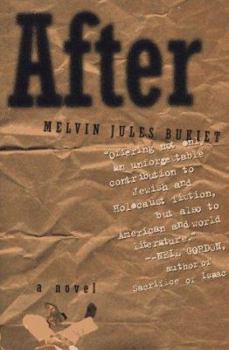After
No Synopsis Available.
Format:Hardcover
Language:English
ISBN:0312145365
ISBN13:9780312145361
Release Date:January 1996
Publisher:St. Martin's Press
Length:384 Pages
Weight:1.25 lbs.
Dimensions:1.3" x 6.0" x 8.5"
Customer Reviews
3 ratings
This one is a keeper, but it's also frustrating.
Published by Thriftbooks.com User , 26 years ago
Melvin Jules Bukiet has to be one of the most promising young writers around, based on the evidence of this book. I would love to say that it's as good as some of its promotion would suggest and that it accomplishes both of the things it has obviously set out to do: one, to write a realistic post-Holocaust novel with survivors as complex characters rather than symbols; two, to parody the genre of Holocaust literature, not in a spirit of cruelty but one of insight. It would seem to be almost impossible to do both at once, which is probably why "After" does not quite come off as either a novel or a satire. The heavy cultural symbolism which Bukiet is trying to send up ends up weighing down his characters to the point where--with one very significant exception--they stop being real people. The satire is also self-indulgent: one is never quite sure whether it is aimed at the reality of the Holocaust (which has, incidentally, received at least six "comic" treatments before this one), or at the serious literature of the Holocaust, or some of the more vulgar conventions of popular culture. The resulting book is something of a jumble, and seems to resort to current postmodern cliches more out of desperation than to make a statement. This is a real pity, because Bukiet is a spectacularly talented writer and could have written one of the great books of the century if he had been able to focus his material somewhat better. The best evidence of his talent lies in his fictional portrait of Elie Wiesel as "Der Schreiber." Subtle, compassionate enough to be brutal (and vice versa), and deeply insightful, it alone is worth the price of the book; it is worthy of such a master of real-life irony as Satyajit Ray, and calls to mind Ray's film "Devi" (with an added twist). The rest of "After" is not on this level--itself ironic, because Bukiet makes much of the contrast between his hero and "Der Schreiber" (a sign that authors should never fall in love with their characters). This book is highly recommended (from someone who almost never likes secondhand Holocaust fiction), but read it as much for what it doesn't do as what it does.
I loved it!
Published by Thriftbooks.com User , 27 years ago
The author tells a story well, but also plays with the reader. Several times you will stop, scratch your head and ask,"Was that directed to me?...and then the story continues. I loved the cynicism or blind faith (in anything) of the various characters and the slow corrosion thereof. The subject matter is facinating and rarely explored. Best of all, this is not a sappy, emotional story, actually, quite the opposite. When a holocaust story makes you laugh, it should be explored
After touches a period of history seldom remembered
Published by Thriftbooks.com User , 28 years ago
With After, Melvin Bukiet has expanded the realm of Holocaust literature to include the struggle following release from the concentration camps. Liberated by milk-fed Americans after years of torture, the main characters find that surviving the camps was not enough.In the bizarre setting of post-WWII Germany, Bukiet weaves a funny, dark, and fantastic world, the very improbability of which is matched brilliantly by his characters' improbable, but ingenius, methods of taking back what was taken from them






